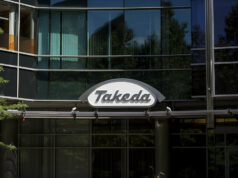
A company focused on next-generation sequencing-based diagnostics is partnering with a large Swiss drugmaker.
Foundation Medicine, based in Cambridge, Massachusetts, said Wednesday that it had formed a collaboration with Novartis. The development and commercialization partnership will involve Novartis using the diagnostics maker’s comprehensive genomic profiling assay, FoundationOne CDx, to develop companion diagnostics for its cancer drugs. FoundationOne CDx received Food and Drug Administration approval in November 2017. Fellow Swiss drugmaker Roche acquired the remaining shares of Foundation Medicine that it didn’t already own in June.
“It is imperative that we collaborate with all of the key stakeholders in oncology to accelerate patient access to personalized medicine,” Foundation Medicine Chief Business Officer Melanie Nallicheri said in a statement.
The partnership will also enable Foundation to expand into markets outside the US. In Japan, it is working with drugmaker Chugai and has submitted FoundationOne CDx for regulatory approval with the Ministry of Health, Labour and Welfare. The company said the move would allow cancer patients in Japan to have access to approved targeted therapies, immunotherapies and clinical trials.
The partnership taps a market that is expected to see significant growth in the coming years as a growing number of cancer drugs targeted to specific genetic mutations and other biomarkers become available. Examples include Merck & Co.’s Keytruda (pembrolizumab), for microsatellite instability-high tumors regardless of which organs they affect; Pfizer and Merck KGaA’s Xalkori (crizotinib) for non-small cell lung cancer with ALK mutations; and Loxo Oncology’s larotrectinib, currently under FDA review for solid tumors with NTRK fusions and expected to receive the agency’s verdict by Nov. 26.
A report released in March by Research and Markets indicated that assuming a 20.1 percent annual growth rate, the global market for companion diagnostics would grow from last year’s $2.61 billion to $6.51 billion by 2022. Improved regulatory guidelines, growing need for targeted therapies, rising cancer incidence and increasing collaborations for companion diagnostics test development were among driving factors.
Still, a study published last month in PLoS One by researchers in the UK and Norway raised questions about how much companion diagnostics improved therapies’ cost effectiveness, at least in the context of metastatic colorectal cancer. According to the American Cancer Society, excluding skin cancers, colorectal cancer is the third most common cancer affecting both sexes and the third leading cause of cancer-related death in the US, with more than 140,000 people expected to be diagnosed with cancers of the colon and rectum this year, and more than 50,600 expected to die.
Analyzing 46 published studies that involved biomarker-guided therapies with companion diagnostics, the researchers found that cancer biomarkers in mCRC were mostly cost-effective or improved the cost effectiveness of targeted therapies through cost savings. At the same time, while they did reduce therapy costs, those reductions were insufficient to make the drugs themselves cost effective. Evaluation of biomarkers in the studies examined was often restricted to the costs of tests and did not consider their clinical values or biomarker presence, the authors concluded.
Photo: iLexx, Getty Images








